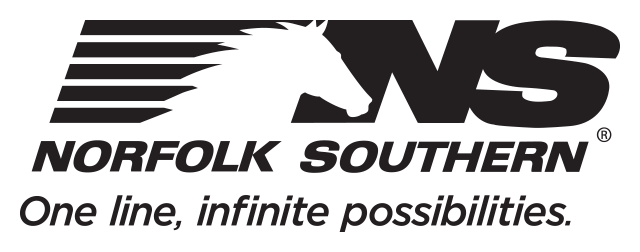NS Helps BMW Reduce Emissions
Making A Business Case, Meeting Sustainability Goals
Most people probably wouldn’t think about Norfolk Southern when they see a BMW sports activity vehicle cruising down the road. In fact, our double-stack intermodal container trains are transporting the parts and components that go into every SAV manufactured at the luxury automaker’s Greer, S.C., assembly plant.
Another thing people might not realize: Our business partnership with BMW is good for the environment, the economy, and residents who commute on South Carolina’s Interstate 26 corridor.
Before we began offering intermodal rail service to the BMW plant in fall of 2013, all of its car parts and components moved in boxes on 18-wheel tractor-trailer trucks to and from the Port of Charleston and the BMW plant. That added to congestion on Interstate 26 and to the automaker’s supply-chain carbon emissions – something the company monitors closely.
In Greer, we now provide BMW with a truck-competitive service that is economical and eco-friendly.
“Our goal is to reduce emissions and support our sustainability targets, and rail is one way to do that if there’s a business case,” said Alfred Haas, the BMW plant’s department manager for material control and transportation control. “This was a business case, and it supported our sustainability targets with reduced emissions that rail service provides in comparison with trucking.”
A Norfolk Southern analysis – using Federal Railroad Administration data that compares average emissions of double-stack intermodal rail and dry van trucks – shows that we will help the BMW plant reduce its supply-chain CO2 emissions by around 64 percent. Our analysis shows that moving 20,000 containers by rail over the 235-mile journey between the BMW factory and the Charleston seaport generates about 3,195 metric tons of CO2 emissions annually. That’s nearly two-thirds less than the 8,895 metric tons emitted when using trucks.
In addition to reducing greenhouse gas emissions, the shift to rail is expected to enhance the commute on I-26, easing truck-traffic congestion and making it safer for passenger vehicles. BMW has estimated that shipping parts by rail will remove 20,000 to 25,000 trucks a year from the interstate.
Opened in 1994, the Greer plant now employs about 8,000 and produces around 300,000 SAV X models annually. The plant, the automaker’s first full auto factory outside Germany, reflects BMW’s commitment to sustainability. About 50 percent of the facility’s energy requirements, for example, is supplied by recovering methane gas that is collected, cleaned, and piped from a regional landfill about 10 miles away, significantly reducing the plant’s CO2 emissions and saving energy costs. Today, the plant is the only one in the world making the X3, X4, X5, and X6 models.
In the early 1990s, when BMW was searching for a U.S. site, Norfolk Southern’s industrial development group joined with South Carolina economic development officials to promote Greer as an ideal location. A Norfolk Southern rail spur at the site was a key factor in BMW’s decision to settle there, BMW officials said.
From the start, Norfolk Southern has transported finished vehicles in multilevel railcars to the Port of Charleston for export to global markets. We gained the ability to offer intermodal service with the opening in October 2013 of the South Carolina Inland Port intermodal terminal, which was constructed and is owned and operated by the South Carolina Ports Authority. Recognizing the economic benefits of an inland port in the state’s growing Upstate region, Norfolk Southern partnered with the ports authority. We provided rail, signal, and other track infrastructure to support the nearly $50 million terminal project.
The inland port is located near Interstate 85 and is less than two miles from the BMW plant. We offer BMW overnight intermodal service, moving containers loaded with parts and components between the factory and the Charleston seaport. The traffic includes import containers shipped on ocean carriers from Europe and also export containers from Greer that are loaded with parts and components for markets such as Russia and India, where final assembly is done. On each end of the move, trucks dray the containers between our rail line and the factory or the port, a trip of about two miles or less.
A Norfolk Southern subsidiary, Thoroughbred Direct Intermodal Service, is responsible for managing these movements, either by rail or truck, and ensuring just-in-time delivery of parts to the BMW plant, making this a unique Norfolk Southern product.
Read more at NSSustainability.com



